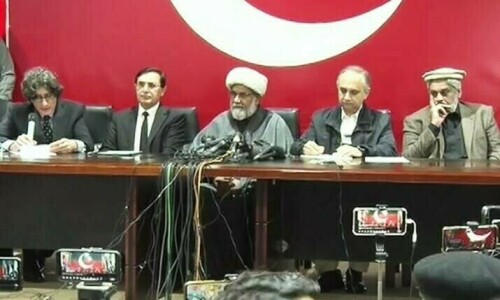The Supreme Court on Tuesday resumed hearing a petition of the Sunni Ittehad Council (SIC) — the new home of PTI-backed candidates — against the denial of reserved seats in assemblies for women and minorities.
A 13-member full court — comprising Justices Syed Mansoor Ali Shah, Munib Akhtar, Yahya Afridi, Aminuddin Khan, Mandokhail, Muhammad Ali Mazhar, Ayesha Malik, Athar Minallah, Syed Hasan Azhar Rizvi, Shahid Waheed, Irfan Saadat Khan and Naeem Akhtar Afghan — is presiding over the hearing.
The proceedings are being broadcast live on the SC’s website and its YouTube channel.
The SIC had earlier been joined by PTI-backed independent candidates after they won the Feb 8 elections as their party had been deprived of its electoral symbol ‘bat’ in an SC ruling.
In a 4-1 verdict in March, the ECP had ruled that the SIC was not entitled to claim quota for reserved seats “due to having non-curable legal defects and violation of a mandatory provision of submission of party list for reserved seats”.
The commission had also decided to distribute the seats among other parliamentary parties, with the PML-N and the PPP becoming major beneficiaries with 16 and five additional seats while the Jamiat Ulema-i-Islam—Fazl (JUI-F) was given four. Meanwhile, the verdict was rejected by the PTI as unconstitutional.
Later the same month, while ruling on an SIC plea, the PHC had dismissed an SIC plea challenging the ECP decision and denied it reserved seats.
On May 6, a three-member SC bench, hearing a petition filed by the SIC, suspended the PHC verdict to the extent of reserved seats distributed over and above the initially allocated ones to political parties.
In accordance with the apex court’s ruling, the ECP had then suspended victory notifications of 77 lawmakers, causing the ruling coalition to lose its two-thirds majority in the National Assembly.
In late May, a full court had been constituted to hear the case, comprising all judges except Justice Musarrat Hilali.
As the case was taken up on June 3, Justice Mandokhail had noted that the public did not vote for independent candidates but those nominated by the PTI in the February 8 general elections.
Meanwhile, Justice Shah suggested that the controversy could be ended if the ECP gave the formerly independent candidate another three days to decide afresh whether to join another political party.
In the next hearing, judges had poked holes in the ECP’s decisions as well as in the SC’s January 13 verdict that denied the electoral symbol of ‘bat’ to the PTI.
The CJP had spent a better part of the hearing defending the verdict which was criticised by his colleague Justice Akhtar, who said the PTI lost its poll symbol because of the SC judgment which led to a “cascading series of errors” by the ECP.
CJP Isa wondered why the PTI candidates did not demand the bat symbol independently in each constituency. But Faisal Siddiqui, a senior counsel representing the SIC, contended that demanding the bat symbol would be a clear subversion of the January 13 judgment. Justice Akhtar observed the same.
The counsels from both sides — the SIC and the beneficiary parties (including the PPP and PML-N) — were then given two entire days starting from today’s hearing to sum up their arguments.
On Saturday, in a concise statement furnished before the SC through senior counsel Sikandar Bashir Mohmand, the ECP justified its decision to deny the SIC reserved seats for women and non-Muslims.
It argued that the SIC did not meet the criteria and therefore was not eligible for reserved seats on account of not being a political party within the meaning of Articles 51(6)(d), 56(6)(e) and 106(3)(c) of the Constitution, as well as the election programme’s requirement to furnish a list of priority (Form 66) in a timely manner for the reserved seats.
The ECP also pointed out that article 3 of the SIC’s constitution limited the party’s membership to adult Muslims only, imposing certain restrictions that violated Articles 17 (freedom of association), 20 (freedom to profess religion and to manage religious institutions) and 25 (equality of citizens) of the Constitution.
In the last hearing, Justice Akhtar asked that “if the ECP, on its own cascades of errors, was channelising, shoehorning people who are returned candidates of a political party into a ‘independent’ status […] — are we bound by that or by what mainly is the intent of the paragraph (law)?”
Meanwhile, CJP Isa had wondered why the independent candidates had not joined the PTI. “Didn’t you (PTI) commit suicide yourself?” the chief justice said while addressing Siddiqui, apparently referring to the PTI’s decisions.
SIC counsel Faisal Siddiqui and Advocate Salman Akram Raja — a petitioner who had contested the February 8 general elections as a PTI-backed candidate — had concluded their arguments yesterday.
The chief justice had stated that the proceedings would not be continued for a third day, ie on Wednesday, and urged all counsels to conclude their arguments today.
At the outset of today’s hearing, the counsel representing the lawmakers who had been denotified following the SC’s May 6 order began presenting his arguments.















































Dear visitor, the comments section is undergoing an overhaul and will return soon.